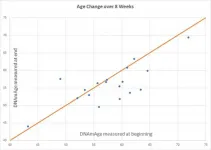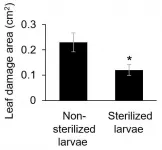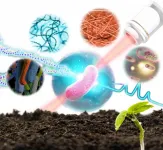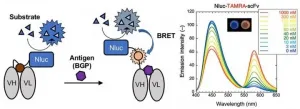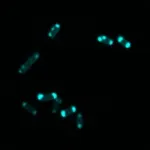INFORMATION:
The new species of bacteria killing palms in Australia
While investigating a disease outbreak in a Queensland botanical gardens, researchers discovered a new species of bacteria that causes a fatal disease in palms
2021-05-27
(Press-News.org) The bacterium, which they named Candidatus Phytoplasma dypsidis was found to cause a fatal wilt disease. This new discovery was reported in the International Journal of Systematic and Evolutionary Microbiology.
In 2016, several ornamental palms within a conservatory in the Cairns Botanic Gardens, Queensland, died mysteriously. A sample was taken from one of the diseased plants and investigated by Dr Richard Davis and colleagues from the Australian Government Department of Agriculture, Water and the Environment, and state and local government. They compared the characteristics and genome of the bacterium identified as the cause of the disease and found the bacterium was similar to other species of Candidatus Phytoplasma, many of which are responsible for disease epidemics in palms elsewhere but was different enough to be an independent species. "When the laboratory testing indicated it was something close to, but not the same as, devastating palm pathogens overseas, we were very surprised," said Dr Davis.
"At first we thought it was most likely an unrelated fungal disease. Almost as an afterthought, I suggested we screen for phytoplasma because there are some very bad phytoplasma diseases of palms moving around the world, including in neighbouring Papua New Guinea," he explained.
So far, infection with Candidatus Phytoplasma dypsidis has been found to cause disease in 12 different species of palms, including Cocos nucifera, which produces coconuts. "Although palms are not grown as a cash crop in Australia, they are important ornamental garden and amenity plants. Coconuts and other palms are an economically significant component of Australia's tourism industry in the tropics," said Dr Davis.
'Palms take on a much greater significance in most of the countries near Australia, in south east Asia and the Pacific, where coconuts are 'the tree of life'. It is important to raise awareness of a new disease threat, such as this, so that regional biosecurity measures can be prioritised."
The bacterium is thought to be spread from plant-to-plant by insects which feed on phloem, the tissue which transports nutrients around the plant, said Dr Davis: "it seems certain from our observations of how this thing has spread through the local area, that there must be an insect vector. Finding out what vector species are involved is a vital next research priority."
Outbreaks of exotic plant pathogens in Australia are rare due to the country's stringent biosecurity measures. "Australia, New Zealand and the Pacific island countries and territories have an enviable plant and animal health status compared to much of the rest of the world. Because we are islands, we have escaped many significant plant disease threats that have travelled around the world, over history," explained Dr Davis, "As biosecurity plant pathologists for the Australian Government Department of Agriculture, Water and the Environment, our team's main role is to look out for and detect incursions of exotic plant pathogens. We usually do this in remote parts of Australia's north, so to come across something much closer to home in the suburbs of Cairns, in far North Queensland, Australia, was unusual. However, we have no evidence to suggest this is an incursion from overseas because it is a unique organism. It may well be indigenous to Australia and some as yet unknown factor has triggered a disease outbreak."
Dr Davis is concerned that this new disease could spread outside of Cairns and affect palm populations further north: "North of Cairns, we have threatened ecological communities of fan palms which are of great environmental significance," he said. It is important for Dr Davis and his team to continue to monitor the spread of Candidatus Phytoplasma dypsidis. A number of questions remain, including which insect vectors are spreading the disease, and whether the bacterium is capable of infecting other types of plant, including important crops such as bananas.
ELSE PRESS RELEASES FROM THIS DATE:
Exploring optimization of duplex velocity criteria for diagnosis of ICA stenosis
2021-05-27
Study Exploring Optimization of Duplex Velocity Criteria for Diagnosis of Internal Carotid Artery (ICA) Stenosis Published Online
Online first in Vascular Medicine, researchers from the Intersocietal Accreditation Commission (IAC) Vascular Testing division report findings of their multi-centered study of duplex ultrasound for diagnosis of internal carotid artery (ICA) stenosis. 1
The study was developed in response to wide variability in the diagnostic criteria used to classify severity of ICA stenosis across vascular laboratories nationwide and following a survey of members of IAC-accredited ...
Aging: Clinical trial on potential reversal of epigenetic age using a diet and lifestyle
2021-05-27
Aging published "Potential reversal of epigenetic age using a diet and lifestyle intervention: a pilot randomized clinical trial" which reported on a randomized controlled clinical trial conducted among 43 healthy adult males between the ages of 50-72. The 8-week treatment program included diet, sleep, exercise and relaxation guidance, and supplemental probiotics and phytonutrients. Genome-wide DNA methylation analysis was conducted on saliva samples using the Illumina Methylation Epic Array and DNAmAge was calculated using the online Horvath DNAmAge clock (also published in Aging). The diet and lifestyle treatment was associated with a 3.23 years decrease in DNAmAge compared with controls. DNAmAge of those in the treatment group decreased by an average 1.96 ...
Books on health, economic inequalities in Latin America, Caribbean shed light on content, impact of health policies
2021-05-27
More than 500,000 people have died from COVID-19 in Latin America and the Caribbean, demonstrating the health and economic inequalities throughout the region. A new article analyzes seven books* that discuss these inequalities, including questions of who gets health care and what interdependent roles societies, social movements, and governments play. To end inequality in the region, the author calls for a universal approach to health care.
The article, by a professor at Carnegie Mellon University (CMU), appears in the June 2021 issue of Latin American Research Review, a journal published by the Latin American Studies Association.
"These books break new ground and contribute to our understanding of some of the most important health ...
Partners in crime: Agricultural pest that relies on bacteria to overcome plant defenses
2021-05-27
Although insect larvae may seem harmless to humans, they can be extremely dangerous to the plant species that many of them feed on, and some of those plant species are important as agricultural crops. Although plants cannot simply flee from danger like animals typically would, many have nonetheless evolved ingenious strategies to defend themselves from herbivores. Herbivorous insect larvae will commonly use their mouths to smear various digestive proteins onto plants that they want to eat, and when plants detect chemicals commonly found in these oral secretions, ...
Engineered defects in crystalline material boosts electrical performance
2021-05-27
AMES, Iowa - Materials engineers don't like to see line defects in functional materials.
The structural flaws along a one-dimensional line of atoms generally degrades performance of electrical materials. So, as a research paper published today by the journal Science reports, these linear defects, or dislocations, "are usually avoided at all costs."
But sometimes, a team of researchers from Europe, Iowa State University and the U.S. Department of Energy's Ames Laboratory report in that paper, engineering those defects in some oxide crystals can actually increase electrical performance.
The research team - led by Jürgen Rödel and Jurij Koruza of the Technical University of Darmstadt in Germany - found certain defects produce significant improvements in two key measurements ...
Researchers develop technique to functionally identify and sequence soil bacteria one cell at a time
2021-05-27
Researchers from the Single-Cell Center at the Qingdao Institute of Bioenergy and Bioprocess Technology (QIBEBT) of the Chinese Academy of Sciences have developed a technique to sort and sequence the genome of bacteria in soil one bacterial cell at a time, while also identifying what its function is in the soil environment.
Their study was published in the journal mSystems on May 27.
Soil is home to a vast and complex microbiome, which features arguably the highest genomic diversity and widest heterogeneity of metabolic activities of cells on Earth. In turn, these metabolic activities can in principle provide the foundation for industrial production of numerous compounds of value.
The ability to pinpoint ...
Shedding new light: A new type of immunosensor for immunoassay tests
2021-05-27
Immunosensors are widely used in immunoassays to detect antigens. One such immunosensor is a quenchbody (Q-body), which contains a modified antibody fragment with a quenched fluorescent dye. When an antigen binds to the Q-body, the dye leaves the antibody and the fluorescence intensifies. The change in fluorescence intensity is easy to measure, making Q-body-based antigen detection systems incredibly simple. However, this method requires an external light source to excite the electrons in the fluorescent dye to produce luminescence.
One way to solve this is to induce luminescence by an alternative method. To achieve this, researchers ...
Climate skeptics not easily persuaded by available evidence, now or later
2021-05-27
EUGENE, ORE. -- May 27, 2021 -- Climate skeptics who aren't persuaded by the existing evidence from climate change are unlikely to change their minds for many years, according to a newly published quantitative study by a University of Oregon environmental economist
The central question posed by the study published in the journal Climate Change was "How much evidence would it take to convince skeptics that they are wrong?" The answer depended on the degree of skepticism. The study modeled two types of hypothetical skeptics -- those who were less extreme and believed the change in temperature was slight, as well as ...
Not fear, but goal importance and others' behavior makes you favour COVID-19 measures
2021-05-27
While earlier research has mostly looked into factors such as fear, perceived risk, age and political views to determine what makes individuals and societies more or less willing to drastically change their lifestyle and support government-imposed strict restrictions, in order to mitigate the spread of the COVID-19 pandemic, psychologists at the University of Zurich Charlotte Kukowski, Katharina Bernecker and Veronika Brandstätter took a different perspective.
Instead, they chose to find out the impact of people's perception of others' behaviour when it comes to the public good, as well as people's own self-control in sticking to behaviour guidelines. By using data from the United Kingdom and Switzerland, they concluded that, ...
Fight against antibiotic-resistant bacteria has a glowing new weapon
2021-05-27
AUSTIN, Texas -- In the perpetual arms races between bacteria and human-made antibiotics, there is a new tool to give human medicine the edge, in part by revealing bacterial weaknesses and potentially by leading to more targeted or new treatments for bacterial infections.
A research team led by scientists at The University of Texas at Austin has developed chemical probes to help identify an enzyme, produced by some types of E. coli and pneumococcal bacteria, known to break down several common types of antibiotics, making these bacteria dangerously resistant to treatment.
"In response to antibiotic ...
LAST 30 PRESS RELEASES:
CU Anschutz School of Medicine receives best ranking in NIH funding in 20 years
Mayo Clinic opens patient information office in Cayman Islands
Phonon lasers unlock ultrabroadband acoustic frequency combs
Babies with an increased likelihood of autism may struggle to settle into deep, restorative sleep, according to a new study from the University of East Anglia.
National Reactor Innovation Center opens Molten Salt Thermophysical Examination Capability at INL
International Progressive MS Alliance awards €6.9 million to three studies researching therapies to address common symptoms of progressive MS
Can your soil’s color predict its health?
Biochar nanomaterials could transform medicine, energy, and climate solutions
Turning waste into power: scientists convert discarded phone batteries and industrial lignin into high-performance sodium battery materials
PhD student maps mysterious upper atmosphere of Uranus for the first time
Idaho National Laboratory to accelerate nuclear energy deployment with NVIDIA AI through the Genesis Mission
Blood test could help guide treatment decisions in germ cell tumors
New ‘scimitar-crested’ Spinosaurus species discovered in the central Sahara
“Cyborg” pancreatic organoids can monitor the maturation of islet cells
Technique to extract concepts from AI models can help steer and monitor model outputs
Study clarifies the cancer genome in domestic cats
Crested Spinosaurus fossil was aquatic, but lived 1,000 kilometers from the Tethys Sea
MULTI-evolve: Rapid evolution of complex multi-mutant proteins
A new method to steer AI output uncovers vulnerabilities and potential improvements
Why some objects in space look like snowmen
Flickering glacial climate may have shaped early human evolution
First AHA/ACC acute pulmonary embolism guideline: prompt diagnosis and treatment are key
Could “cyborg” transplants replace pancreatic tissue damaged by diabetes?
Hearing a molecule’s solo performance
Justice after trauma? Race, red tape keep sexual assault victims from compensation
Columbia researchers awarded ARPA-H funding to speed diagnosis of lymphatic disorders
James R. Downing, MD, to step down as president and CEO of St. Jude Children’s Research Hospital in late 2026
A remote-controlled CAR-T for safer immunotherapy
UT College of Veterinary Medicine dean elected Fellow of the American Academy of Microbiology
AERA selects 34 exemplary scholars as 2026 Fellows
[Press-News.org] The new species of bacteria killing palms in AustraliaWhile investigating a disease outbreak in a Queensland botanical gardens, researchers discovered a new species of bacteria that causes a fatal disease in palms
